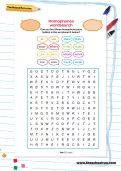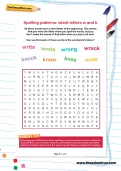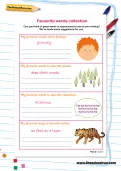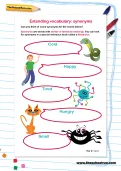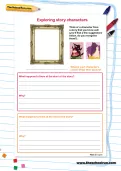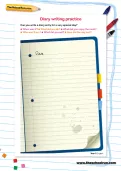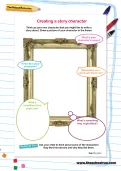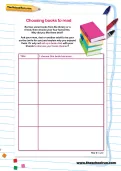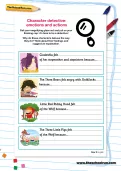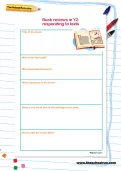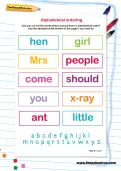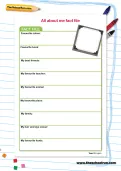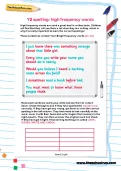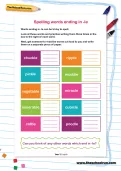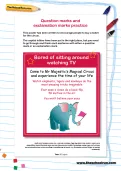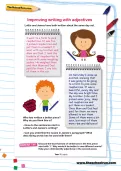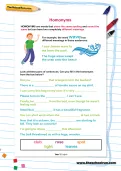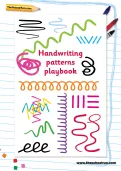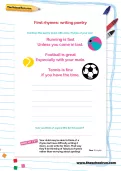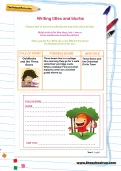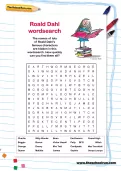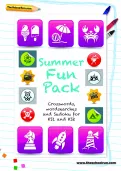Can you think of great words or expressions to use in your writing? We’ve made some suggestions for you. What are your favourite words about your feelings? What are your favourite words to describe places? What about describing characters or actions?
or
Register to add to your saved resources
Already a subscriber? to view this content.
Can you think of some synonyms for these words? Synonyms are words with similar or identical meanings. You can look for synonyms in a special reference book called a thesaurus.
or
Register to add to your saved resources
Already a subscriber? to view this content.
Think of a character from a story that you know well (you’ll find a few suggestions here, do you recognise them?). What is your character’s name? Draw their picture! What happens to them at the start of the story? What happens to them at the end of the story?
or
Register to add to your saved resources
Already a subscriber? to view this content.
Can you write a diary entry for a very special day? When was it? What did you do? What did you enjoy the most? Who was there? What did you eat? How did the day end?
or
Register to add to your saved resources
Already a subscriber? to view this content.
Think up your own character that you might like to write a story about. Draw a picture of your character in the frame, answering questions like: How old is your character?; What is your character's name?; What's something they might say? If it helps, think about some of the characters you like from stories and why you like them.
or
Register to add to your saved resources
Already a subscriber? to view this content.
Borrow some books from the library or a friend, then choose your four favourites. Why did you like them best? Ask your mum, dad or another adult to be your scribe (write for you) and explain why you enjoyed them. Or why not set up a book club with your friends to discuss your book choices?
or
Register to add to your saved resources
Already a subscriber? to view this content.
Get your magnifying glass out and put on your thinking cap: it’s time to be a detective! Why do these characters behave the way they do? Think about their feelings and suggest an explanation. Write it down in the right box.
or
Register to add to your saved resources
Already a subscriber? to view this content.
A template for a book review, to encourage children to respond to texts. Answer questions including: Title of book?; Who wrote the book?; Who illustrated the book?; What happened in the book?; Draw a picture of one of the settings in the book; Did you like the book? Why?
or
Register to add to your saved resources
Can you cut out the words below and put them in alphabetical order? Use the alphabet at the bottom of the page if you need to!
or
Register to add to your saved resources
Already a subscriber? to view this content.
Fill in this fact file all about yourself. What is your favourite colour? Your favourite book? Who are your best friends? Your favourite teacher? This is the place to put all those really important facts.
or
Register to add to your saved resources
Already a subscriber? to view this content.
A list of high frequency words created by an experienced teacher and based on the National Curriculum. Children will need to learn these in Year 2 spelling.
or
Register to add to your saved resources
Words ending in -le can be tricky to spell. Look at these words and practise writing them three times in the box to the right of each word. Next, get someone to read the words out loud to you and write them on a separate piece of paper.
or
Register to add to your saved resources
Already a subscriber? to view this content.
This poster has been written to encourage people to buy a ticket for the circus. The capital letters have been put in the right place, but you need to go through and finish each sentence with either a question mark or an exclamation mark.
or
Register to add to your saved resources
Already a subscriber? to view this content.
Lottie and James have both written about the same day out. Who has written a better piece? Why do you think this is? How do the sentences start in Lottie’s and James’s writing? Can you underline the nouns in James’s paragraph? What describing words has he used with them?
or
Register to add to your saved resources
Already a subscriber? to view this content.
Homonyms are words that share the same spelling and sound the same but can have two completely different meanings. Look at these pairs of sentences. Can you fill in the homonyms from the box below?
or
Register to add to your saved resources
Already a subscriber? to view this content.
Before children are able to start writing letters and words their hands and muscles need to get used to producing marks on paper. Our Patterns playbook offers your child the opportunity to
practise common writing patterns in preparation for handwriting letters at age 4 or 5. It's also a fun way to encourage an older child who has trouble writing particular letters. Can they make some waves, draw some curly baby hair and decorate a birthday cake with Smarties, all while doing some vital handwriting practice?
or
Register to add to your saved resources
Already a subscriber? to view this content.
Continue this sporty poem with some rhymes of your own.
or
Register to add to your saved resources
Already a subscriber? to view this content.
Choose one of your favourite stories and write down its title. Write a blurb for this story, too – two or three sentences would be perfect. Then, just for fun, think up a new title for the story!
or
Register to add to your saved resources
Already a subscriber? to view this content.
A fun Roald Dahl wordsearch for primary school children, created by a teacher and featuring the names of Roald Dahl's famous characters!
Witches, foxes, earthworms and more – they're all wonderful characters from Roald Dahl's books. See if you can spot the names of 20 children, villains and creatures from The BFG, Danny the Champion of the world, Charlie and the Chocolate Factory and other Dahl classics in this wordsearch. How quickly can you complete it?
or
Register to add to your saved resources
Keep boredom at bay with some brilliant puzzles for KS1 and KS2! Your child will need to use all their spelling and numeracy skills to solve wordsearches, crosswords, Sudoku and Wordoku – and there are a few extra challenges to keep them busy, too!
or
Register to add to your saved resources
Already a subscriber? to view this content.
